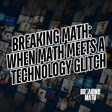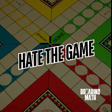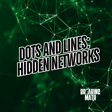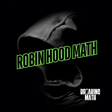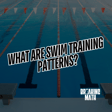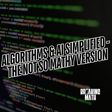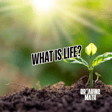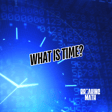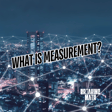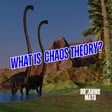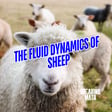Math's Role in Revealing Inequality
00:00:00
Speaker
Imagine the inequality symbols we learned in algebra class. Those little arrows pointing left and right weren't just about numbers, but about people, power, and opportunity.
00:00:11
Speaker
What if math could give us sharper tools to see the hidden patterns of unfairness in society and even show us how to change them?
Introducing Eugene Yuchang and 'Unequal'
00:00:20
Speaker
That's exactly the challenge posed by mathematician, educator, and author Eugene Yuchang in her new book, Unequal.
00:00:28
Speaker
She's the scientist in residence at the Art Institute of Chicago and also an honorary visiting fellow at the University of Sheffield in the UK. She's known for weaving deep mathematics with human stories and often asks us to rethink what fairness really means and why simple equality isn't always enough.
Focus on Math and Inequality
00:00:52
Speaker
I'm your host, Autumn Feneff. And today on Breaking Math, we're going to dive deep into concepts like abstraction, generalization, and even some outliers that help us understand inequality in a whole new way. We'll explore why math, often thought of as neutral or cold, may actually be one of the most powerful lenses for justice.
00:01:16
Speaker
So grab your coffee, maybe even a bagel, your curiosity, and a notebook, because we're learning about how math doesn't just describe the world we live in but it can also help us build a more fair and compassionate one.
Efficiency in Problem Solving
00:01:32
Speaker
hi Eugenia. Welcome to Breaking Math. How are you doing today? Hey, I'm doing great. Thank you very much for having me on. Thank you for coming on the show. Now, what inspired you to write on equal... And while you're here, you might want to elaborate a little bit why on mathematicians are lazy.
00:01:49
Speaker
I'm just going to get you in trouble and say that up front. Very much trouble. Always in trouble. i in particular, am very lazy. but I like to think I'm not lazy in the sense of cutting corners and not doing the things I'm supposed to do.
00:02:03
Speaker
But what I really like is finding better, more efficient and fun ways to do things so that I can use my brain more smoothly and more efficiently and then get more done. That's what I mean by being lazy. Mathematicians don't like doing the same thing over and over again.
00:02:20
Speaker
It's kind of like you don't want to keep washing each dish individually. So thank goodness somebody invented the dishwasher. And so I like to think math is a bit like dishwashers, except they're inside our brain, where we don't want to keep doing the same thing repeatedly. So we come up with some general theory so that we can do it once, be done with it, and then get on with something else. So that's what I mean by us being
Motivation Behind 'Unequal'
00:02:43
Speaker
lazy. And the reason that I wanted to write this book is because, well, equality is always such an important topic, I think. I really care about the way that the world is fair and unfair to different people. And the thing that really catalyzed it, unfortunately, was a terrible argument that I had with someone about what fairness even means. And was trying to point out that we were taking different approaches to the idea of treating people fairly. And
00:03:11
Speaker
And he just kept saying, you don't get to say what fairness means. Somehow he his notion of fairness was correct. Mine was just wrong. And I thought, well, even in mathematics, there are just different approaches to what equality and inequality can mean. It's not rigid and black and white, and there's only one definition.
00:03:31
Speaker
And I thought about all the different approaches that math has. that illuminates this for us and gives us ways to think about it. And then it turned into a book in my head. And I thought, well, maybe more people could benefit from this.
00:03:44
Speaker
And maybe I can share this with the world and try to help people navigate these difficult discussions and show some cool math. Absolutely. I actually have to agree with you, but I'm just going to put this out here.
00:03:55
Speaker
It's the fact that a man said it. I mean, and it was the fact that he was just so convinced that he was right and that whatever I was saying was wrong. Whereas I was prepared to say, well, let's think about the different senses in which these different things could be applicable. and We're just taking different points of view. And I always try to say that about math.
00:04:13
Speaker
Math is actually about taking different points of view on the same thing and seeing which point of view is helpful to us and then deliberately choosing that point of view and taking responsibility for having chosen
From Mathematician to Author
00:04:26
Speaker
it. I agree with you. With that, can you also tell us a little bit about your background and your mathematical journey as well? Yeah, i started out as a traditional pure mathematician. So that's the part of math that appears to be very, very removed from daily life. And I was teaching and doing research in ordinary research universities, having a pretty standard career path as a research mathematician.
00:04:52
Speaker
And then I got disillusioned with it. And I felt like I wanted to help more people get into math because I was teaching math to people who already loved math. And there are so many people who have been put off math by earlier parts of their math education in ways that make me sad because I think they haven't seen what math is really like or they've been kept out of it by gatekeeping or by the wrong things, you know, tests or memorization or having to do things really fast, which isn't really what math is about.
00:05:20
Speaker
So I really wanted to reach those people rather than the people who already loved math and had been successful at it. And so I wrote my first book, How to Bake Pie, and it did pretty well, well enough that I was able step off the normal career path and build myself a portfolio career where I now teach math in a much more unusual setting to art students at the School of the Art Institute of Chicago,
00:05:46
Speaker
And I write, I've written more books. This is my ninth book that is coming out, all to help other people get into math when they've been put off it in the past. I make mathematical art in institute, stuff I play the piano, I compose, I do a lot of public speaking.
00:06:01
Speaker
And so I combine so many things that I care about rather than just doing one thing. Binding what you care about actually is, I think, is the best thing to fuel your career and fuel the future, especially to achieve and inspire.
00:06:17
Speaker
the next generation of scientists. Mathematics is just as important as the arts. And the fact that you are at the Art Institute of Chicago, and it it's the best place to be at. Yeah,
Math and Creativity: Bridging STEM and Arts
00:06:30
Speaker
thanks. And I do think that we really shouldn't pit Math and the arts against each other. Sometimes there's a whole, oh, STEM is really important. And then there's a pushback against it saying, no, creativity is really important because STEM is all the things that AI will take over.
00:06:45
Speaker
But that's not an either or situation. And it's really important to show that there is creativity in STEM as well. So I always try to show that there is tons of creativity in math. And math gives us more ways to use our brain creatively. And it gives us techniques for doing that.
00:07:02
Speaker
It's just that it's very often not presented like that in normal education because it's often presented as a series of rules. You just have to follow the rules and then you either get the right answer or you don't. And if you get the right answer, you're labelled as good at math.
00:07:16
Speaker
And if you don't, or if you question those processes or you ask why... then you get labelled as bad at math. And a lot of my art students say that that's what pushed them towards art because they liked math up to a certain point and then they were but bad at it.
00:07:31
Speaker
And so they went towards art. And I'm not saying it's bad to go towards art. It's just unfortunate to label people as good and bad in such a clear cut way when really there are so many different ways to be good and bad at things and to appreciate things, even whether you're good or bad or something else at them.
00:07:47
Speaker
So I noticed in the book, you capture math as not just being black and white or good or bad. And the equations actually capture the nuance of this.
00:07:59
Speaker
So how can this idea help people see the inequality as much more subtle and accurate? Well, it's really about seeing inequality as part of equality and that we draw a line in between them and the line can change. It's not in a strictly fixed place.
00:08:17
Speaker
And so, for example, one equals one is a very, very clear cut equality. There's nothing different about one and one. So that is a very boring and useless equation.
00:08:28
Speaker
Any equation that we bother saying has some difference between the left-hand side and the right-hand side. Even if it's something really simple like 1 plus 4 equals 4 plus 1, that is a very straightforward equation. And you might just go, oh well, it's obviously the same because they're both 5.
00:08:45
Speaker
But they're showing us different processes. One is you take one thing and then four things. And the other one is you take four things and then one thing. And there may be situations in which those don't count as the same.
00:08:58
Speaker
Just like in when you multiply things, two times three is two lots of three things, and three times two is three lots of two things. And there are situations where those aren't exactly the same. So if you have two packets of cookies, each of which has three cookies in, that's not the same as three packets of cookies, each of which has two cookies in.
00:09:18
Speaker
For a start, one of them wastes more plastic. And there are other situations where, for example, in music, if you do two groups of three, that's going one, two, three, one, two, three.
00:09:28
Speaker
And if you do three groups of two, that's going one, two, one, two, one, two. And those aren't the same. And composers can use that to produce interesting rhythmic features. And the point is that the total is the same, but the way of producing the total is different.
Equality in Math vs. Real-World Inequalities
00:09:43
Speaker
And once you start seeing that there's something the same and something different at the same time, you see that there are different choices you can make about whether they will or won't count as the same.
00:09:54
Speaker
And as mathematics goes on to study much more interesting and subtle objects than numbers, it studies things like shapes or arguments or other logical structures, then the the place where we draw the line between what counts as the same and not the same is much more changeable. And then we get to make a decision about where we're going to put it, depending on what context we're in. I agree with that.
00:10:19
Speaker
Now, one thing that depending on context we're you have and an example in the book is the number eight or the infinity sign. And it's topologically equivalent to a pair of pants.
00:10:33
Speaker
Yeah. Just the simple things that we don't think about in our daily life. I don't think you're going to want to put a little line that's an eight on as a pair of pants because the length of this matter.
00:10:47
Speaker
Yes. So it would be a very, very short story. extremely short pair of shorts. and And so there it does matter. Right. But topologically, what that means is when we say they're topologically the same, top topology is a branch of math studying the shapes of spaces where what we're really concerned with is connectivity.
00:11:06
Speaker
We're not really concerned with length. or angles. So in geometry, we're really concerned with lengths and angles and corners, whereas in topology, we're really concerned with paths.
00:11:19
Speaker
And on a figure eight, you can go, there are two loops and they're joined together. And on a pair of pants, there's still basically two loops joined together. So the paths you can make through the pair of pants are essentially the same as the ones on the figure eight, but they make very different kinds of clothing. Yes, exactly.
00:11:37
Speaker
Now, with numbers being powerful simplifications, they can also mislead us when we forget get what they leave out. Could you share a couple of examples where we're relying too much on numbers, test scores, and also some obscure real inequalities?
Risks of Quantifying Achievements
00:11:58
Speaker
Yeah, so numbers are powerful because they are simple. And they're also dangerous because they're simple. And so they're powerful because it means we have some we can quantify everything. We can line everything up in a straight line and compare them very directly with numbers because numbers fit in a one-dimensional straight line.
00:12:16
Speaker
But that is also dangerous because we have to forget so much information in order to do that. And we if we forget the information, and if we also forget that we forgot the information... then things can get really dangerous. And so test scores are really contentious example because when we we have students sit a test, if they just get one number at the end, we haven't really captured anything. We've turned a student into a number and then we're just rating them against each other in terms of numbers.
00:12:44
Speaker
Whereas that number might be containing many different types of achievement. So it might be how much they managed to memorize. It might be how just fast they were at writing things down. It might be whether they have a comfortable home in a quiet area so that they could get a good night's sleep before that.
00:13:04
Speaker
It might also be how much private tuition that they their parents were able to pay for them in advance. And so there are so many things hiding in there before we even think about the different skills that we might want to test, because really there are different skills such as understanding, being able to build arguments, being able to understand other people's arguments, being able to recall definitions, and those all get lumped together into a single number, which is just not very subtle. And Why do we do it? Well, we still have this idea that we want to put everyone in a hierarchy and rank everyone against everyone else. and
00:13:38
Speaker
we should really think about why we want to do that and why we want to put everyone into a one-dimensional hierarchy, which there are many reasons that knock onto each other because then it turns into a oh how are we going to decide who goes gets to go to which university? But then there's the question of, well, why should some people deserve to go to one university and some people shouldn't? That's a whole question in there that...
00:14:00
Speaker
we kind of avoid talking about when we just talk about whether we should test people or not. Also, it makes me think a lot more about political debates and where people are arguing at different levels.
00:14:13
Speaker
Do you want to go into that topic a little bit for us? Yeah, sure. And that all these arguments and contentious disagreements come from some fundamental different beliefs that It's not that anyone is being, i don't i don't like to sit down and go that some people are being irrational or illogical.
00:14:32
Speaker
What math tells us is that if you start with different beliefs and you you you proceed from those beliefs, you will build a different world of overall beliefs.
00:14:43
Speaker
And math, the discipline of math, gives us a way of unpacking a world down to its basic starting points so we can see where the disagreement really is and so for example the disagreement might not be about whether everyone has a right to say health care the disagreement might be just what is the best way to provide health care for everybody or some people might really think that not everyone deserves health care because they don't want to
Beliefs, Outcomes, and Math's Role
00:15:11
Speaker
pay. that They might class it as something that everyone should pay for for themselves. So then there's a question of what should everyone pay for for themselves and what should be provided by society?
00:15:20
Speaker
And then we can see that there are lines we all draw in different places about what we should provide for ourselves and what we should provide as a society. And then we can maybe have a more sensible argument about where we're drawing those lines rather than just saying, no, I don't want to pay for anything for anyone else. when maybe we can agree that perhaps maybe roads.
00:15:38
Speaker
Maybe we can't just all each pay for the roads that we use because that would... would no Right. So essentially, whatever metric we're using, you have to be very intentional about those choices.
00:15:50
Speaker
Yes. and math says that If we start in one place and we build one world, that doesn't mean we're stuck there forever. We're saying this is what happens in this place with these starting points.
00:16:02
Speaker
Here's another place with different starting points where something else can happen. And so, for example, in the ordinary numbers, we go one, two, three, four, and it keeps going forever. There are other worlds of numbers where you do one plus one and you get zero.
00:16:16
Speaker
And that's just a different context where sometimes if you do something twice it's the same as doing it zero times like if you turn a piece of paper over and then you turn it over again you're back to where you started and it's like you didn't do it and that's also a slightly different situation from if you push an elevator button and there's that thing where you've you've already pressed it and you're standing there and then someone else comes along and presses the elevator button like you're an idiot and you didn't press it You've already pressed it. That doesn't call two elevators.
00:16:44
Speaker
It's just the same as having done it once. So in that situation, one add one is one. And sometimes some people can get very uncomfortable or even angry about the idea that one plus one can equal different things.
00:16:57
Speaker
And that's valid. And you might go, oh, that doesn't count. That doesn't count. This situation also doesn't count. Oh, that one also doesn't count. And that is valid, but it's not what mathematicians do. Mathematicians go, that's an interesting situation.
00:17:09
Speaker
Let's study that and see what logical consequences there are to it. We don't just go, oh, that doesn't count. Now, in the book, you say it's fine to forget the details, but we must remember that we forget
Applying Math to Real Life
00:17:22
Speaker
them. How can this principle guide us when dealing with everything from policy, data, or even personal decisions when we're dealing with fairness? Yeah, so if we if we forget some details and then forget that we forgot them, then we will proceed through life as if those things don't exist, when in fact those things really do exist. Math is about forgetting small details that get in the way of things behaving logically.
00:17:49
Speaker
But we don't forget them forever. We have to remember that they were there so that when we try and apply it back into life, we remember what it was that we did. And so, for example, if we are measuring things, then say, because we're weighing things, that when we're dealing with the numbers, it turns into numbers and it doesn't really matter whether it was grams or ounces or pounds.
00:18:09
Speaker
But then when we're coming back into life, it really does matter what those units were. And there are some famous examples in space exploration, I think, where someone was using imperial and someone else was using metric. And that really caused everything to go wrong because they forgot at the level of numbers. It's just numbers. It doesn't matter. But then when you come back again, you really need to remember where it was you started and what the details were that you forgot.
00:18:35
Speaker
And I've done that myself when I'm using a a meat thermometer because I moved from the UK to the US. And so I grew up with centigrade and I'm trying to do Fahrenheit. And if i my meat thermometer is set to the wrong thing and I see the numbers going up and at the beginning, it doesn't matter. But at the end, it really does. Because if you're aiming for, you know, 180 Fahrenheit and you're waiting for it to get there and it's actually in centigrade, you're going to end up with something very burnt.
00:19:00
Speaker
I don't think you actually want to have your cake burnt when you're cooking things either. Or baking a pie. no right. Now, thinking about that a lot more, you also go into category theory, which is notoriously abstract, yet you liken it to enjoying art without needing to know all of the techniques and technical terms.
00:19:27
Speaker
Now, how do you hope people actually translate their experiences in mathematics to to abstraction, whether it's as art, logic, or even
Appreciating Math Like Art
00:19:39
Speaker
both? There are a lot of places in the book where I try to reassure the reader all the time that I'm not expecting you to understand all of this. And actually, mathematicians don't understand all of it.
00:19:51
Speaker
But I still want to show it because I think too often we keep people out of math if we don't think they can do it. Whereas there are many other things where you're allowed to go and see things even if you can't do it.
00:20:03
Speaker
You're allowed to go into an art museum and look at art even if you're not very good at painting yourself. And you're allowed to go to a concert even if you don't play any instruments and you don't make music yourself.
00:20:14
Speaker
And I think we should show people math and show how to appreciate it, even if you can't do it yourself. And so I show a lot of things that I am not expecting people to understand. And one of the things I think that's important about math education is realizing that we don't understand everything.
00:20:32
Speaker
And that if you feel like you don't understand it, that doesn't mean that you're bad at math. It might mean that you are seeking deeper understanding. Whereas the people who think they understand it, they're just not seeking deeper understanding.
00:20:45
Speaker
Because nobody understands it. Mathematicians at the highest levels don't understand it. Every mathematician I know goes around the whole time feeling kind of stupid because we're spending all our time with things that we don't really understand.
00:20:56
Speaker
And so I want to encourage people to feel okay with that. And that's one of the things I love. about teaching small children math. And I've written a couple of books for children as well. And I love that because I feel that children are much more comfortable with the idea of not really understanding things, because they go through the whole world all the time not understanding things because they're small children.
00:21:16
Speaker
And then adults get a bit freaked out. If you don't understand something completely, you run away. So I put some category theory in there because I want to show I want to take people on a journey through to things that are more complicated rather than saying, oh, no, that's going to be too hard for you. No, I won't show you that.
00:21:32
Speaker
I want to go, look, here are some things that this is how math happens at high levels so that you can see that it's not about numbers or equations. There's complicated diagrams. I put some in that I didn't explain at all just to go Whoa, look at this thing.
00:21:47
Speaker
And to feel some of that, or like you can look at a tall building and go, whoa, I don't know. You don't know how they built it. Or you can look at something like the Grand Canyon and you can go, whoa, you don't know how that got there. I mean, you can start learning. Then hopefully that will...
00:22:02
Speaker
pique your interest and you can look at it without knowing anything about it. And then you can maybe feel like learning about the geology of how that canyon was formed. And I started talking about this and I realized I have no idea how the Grand Canyon was formed. So as soon as we get off this call, think I'm going to look up the geology but behind how the Grand Canyon came to be there. And it's just about the idea that math starts with curiosity, wondering how things work, wondering why things work.
00:22:29
Speaker
And category theory is about how things relate to each other. So I think it's not it's not just about what things are equal and what things aren't. It's about other relationships in between. So it really goes into those grey areas in between things being just equal and not equal and saying, what are all the different ways in which things can be related in between just not equal
Nuances of Equality in Society
00:22:52
Speaker
and equal? If you're thinking about the in-between equal and unequal, there's some there's a lot of gray area and neutrality.
00:22:59
Speaker
Is neutrality dangerous? People think of math as neutral or objective, but where does this really play into... ah fact It depends what you mean by neutral.
00:23:11
Speaker
So what I mean about the grey area is that that equality is very, very rigid as a concept. And among all the things that aren't equal, there are many things we can say other than just not equal.
00:23:24
Speaker
It's like the fact that if if it's cold outside, then that's a very strong thing to say. But there are a lot of ways in which the weather can be not cold, besides the fact that it could be slightly cold, it could be lukewarm, it could be mild, it could be hot, it could be extreme. hot, it could be wildly hot, but it could also, you know, it could be raining and it could be warm rain. It could be cold. There's just so many more things.
00:23:47
Speaker
And when we even talking about something being on a continuum with a gray area, even that is a bit simplified because that's a one dimensional continuum. Really, there's a whole range of things other than just being equal. Equal is like a tiny dot in a huge sea of different possibilities.
00:24:07
Speaker
And so usually we're thinking about more than just the tiny dot because the only things that are really, really, really equal to to things are themselves. Everything is equal to themselves.
00:24:17
Speaker
And that's not interesting at all. So when we're talking about equality between, say, people, then we're not saying that anyone is the same as anyone else. Because no one's the same as anyone else, in fact.
00:24:28
Speaker
What we're saying is something much more subtle, like how should we treat people? Or what role do people deserve to have in society? Or something. And so once we realise that it's not a very strictly defined notion, then I think it focuses our attention on what it is we're really trying to say.
00:24:47
Speaker
and where we're deciding to to say that something is not equal. And so, for example, if we say the weather is the same today as it was yesterday, we're not saying it's exactly the same, but there's some kind of range around the same that we've decided to count as the same.
00:25:02
Speaker
And somebody else who's maybe more sensitive to the cold or more sensitive to the hot might go, what are you talking about? Today is completely freezing compared with yesterday. And so then you can sort of talk about Who is sensitive to different kinds of temperature? Just thinking about the temperature, also explore fairness with this equality as well.
00:25:25
Speaker
So would you like to share how math can actually help us get through these real world context like education or justice?
Math's Guidance on Fairness
00:25:35
Speaker
Yeah, there are various things I think of when I think about this. So one of them is the way we measure how far someone has come.
00:25:42
Speaker
Because if we're trying to evaluate two different job applications, for example, then we're trying to evaluate what someone has achieved up to this point. And some people say, well, we should just look at what they've achieved.
00:25:53
Speaker
But math says if you're measuring distance, first of all, you have to think about where the person started, not just where they are now. And also you have to, there are different ways of measuring it. And so there's a concept that I introduced in the book, which is quite advanced. So I enjoyed introducing it.
00:26:09
Speaker
And it's about other ways to measure distance that might take into account, for example, whether you're going uphill or downhill, or whether there's a wind against you, or whether you're swimming upstream or downstream.
00:26:20
Speaker
And those are called metrics. And metrics are any way to measure things that take into account anything you decide. But you have to decide in advance and sort of make it clear. It's like when you're doing math, you start by announcing what it is you're doing so that everyone knows.
00:26:34
Speaker
And it's a wonderful way to avoid ambiguity because then you can't backtrack. You have to really be clear what you're doing. So you decide what metric you're using. And if you're using a metric that takes into account how much people have had support as opposed to how much obstruction they've faced, then I think you come up with something very different.
00:26:53
Speaker
For example, some students who go to university have had to work against everyone telling them that they shouldn't go. they Some people come from families where no one has been to university before, where they're sceptical of university, where they say, no, university isn't for you.
00:27:09
Speaker
Whereas, for example, I came from a family where it was basically it just assumed that I would go to university. We're not that many generations into it, but still it was just, and I had all my friends basically just kind of vaguely assumed that they would go to university.
00:27:24
Speaker
And so we all had, it's like having a tailwind. It's just pushing with you. Whereas if you fought against it, then that's a whole different set of struggles. And so i think it's a question of whether we should take that into account or not.
00:27:37
Speaker
And it's not about about giving people extra help. It's about taking into account the help that they failed to get in the past or the obstructions that they received.
00:27:48
Speaker
Or for example, if someone has you know, been through their whole education without having a home. If they managed to achieve the same things on paper as someone else who had a luxurious home, a supportive family and private tuition, then i would be more impressed by the person who managed to do that without having even had a home to go home to.
00:28:14
Speaker
unhoused but have a home but if they don't have a stable house to go to then i would be way more impressed by what they had managed to achieve and i would be basically i would have amazing ideas of what they might be able to do if they did have a stable housing situation And so that's what I think of when I think of treating people fairly. No, it's not about treating people the same. It's about evaluating their paths, taking into account a fuller context, which I think is is really important. But people can disagree, but then we can have a maybe more sensible disagreement about why we're not taking into account those contexts. Now, do you see parallels between mathematics and how society actually treats marginalized voices or just these real world scenarios?
Math's Reflection on Marginalized Voices
00:29:02
Speaker
I've seen this. I'll say I've taught at a community college and four-year institution. And you just brought up the fact that a lot of students that are unhoused and don't have even I'll add in the fact that some people don't have the proper mentorship to get to whatever successful metric.
00:29:19
Speaker
However, we're going to define success. Do you see some sort of parallel between that? There are often situations where ah we're focusing too much on the majority or the middle because because practicalities force us to do that.
00:29:34
Speaker
But also scientific studies do that. They always produce results about some percentage of people being able to do this. Or overall, the studies never say everybody.
00:29:45
Speaker
one of my One of my pet peeves is the one that says that ah physical exercise is good for your mental health. Because, of course, it's only good for some people's mental health and only some physical yeah physical activity makes me extremely miserable.
00:29:59
Speaker
And so we have to realize that those things are overall things and then individual situations are very different from that. And what you say about mentoring is really important because my experience was that when I was finishing my PhD and applying for postdoctoral positions, I did not believe that I was that great. And compared with some of my maybe male colleagues who thought they were amazing and deserve to have the greatest jobs ever.
00:30:26
Speaker
And it was only because somebody fished me out and sort of made me apply for a much more prestigious job than I would have done because I would never. This was when I first moved to Chicago. And I had a job at the University of Chicago. I would never have applied for that myself because I would never have dreamt that I was good enough.
00:30:44
Speaker
But then a professor noticed that I was, and in his opinion, devaluing myself. And he kind of pushed me to apply for it. And then I got it. And then my career really got going. And so I was definitely the kind of person who needed somebody to push me because otherwise I would have gone, no, I don't think I'm good enough.
00:31:01
Speaker
Whereas there are other people who think they're great all the time. So it's not about, it's not about, I don't think that was about giving me extra help. It was about giving me the help that I needed to flourish.
00:31:14
Speaker
that i And it didn't mean that I was worse. So it wasn't kind of lowering the standards to get me in. It was realizing that I was keeping myself out. by not believing in myself.
00:31:25
Speaker
And that's a very crucial difference because sometimes people can think that it's about lowering standards to let underrepresented people in. And I think it really isn't. I think it's about finding people who've been kept out unfairly and finding people who've been underrepresented.
00:31:41
Speaker
Because I think i think I've ah accomplished plenty to justify the fact that I deserve to be fished out and that I could believe in myself more.
00:31:52
Speaker
You're absolutely wonderful and never undervalue that. Thank you. just Just seeing the way you think so, I'll say abstractly, and the ability to integrate all of these different topics and make them so understandable to the general population.
00:32:12
Speaker
We need more women like you in the field. We need more abstract thinkers who can pull that in. So... Always remember your worth.
00:32:23
Speaker
um but how How did someone put it to me one day? Just remember that every successful man always has a more successful woman behind them. So they're most likely riding on your coattails.
00:32:39
Speaker
You know, when I was younger, I didn't want to draw attention to myself as a woman in a male-dominated field because I was trying to assimilate. i was trying really hard to assimilate. And I thought, just want to be evaluated on just the strength of my math alone.
00:32:54
Speaker
And it took me a really long time to realize that my math was being evaluated differently because I was a woman. And so when people helped me, it was to counteract that unfairness. It wasn't to give me extra help.
00:33:06
Speaker
And so there are other male mathematicians who got papers published in very prestigious journals, but then they had to retract them because they turned out to be wrong. Whereas my papers got obstructed from being published repeatedly, although there was nothing wrong with them, just because somebody was coming up with some really pedantic objection or just claiming something that wasn't correct.
Gender Bias in Academia
00:33:29
Speaker
Meanwhile, other people get things published without anyone really checking. And there have even been situations where my paper has been, a referee has objected to my paper because there's an error in somebody else's paper, in a male mathematician's paper, that they only noticed when I referred to the other person's work. So when he published it, nobody noticed it was wrong.
00:33:49
Speaker
Then when I referred to it, suddenly there's an objection that turns out to be wrong. And that is is extremely frustrating. And then I had an experience recently where I was very honoured to be invited to give us a talk in a... It was a talk called the Distinguished Women in Mathematics Lecture at a certain university.
00:34:06
Speaker
They have one a year. And when I was younger, I would not have wanted to do that. And I know that there are female mathematicians who still don't want to because they worry that they've only been picked because they're a woman. And what want say is not... only being picked because you're woman. not only being picked because you're a woman.
00:34:22
Speaker
You only weren't picked otherwise because you were a woman. You were perfectly good enough. And when I looked at that series of talks, of which one was a distinguished woman in mathematics, you know, every single other speaker was a man. And if there hadn't been one where they were forced to pick a woman, I don't think they'd have had any women.
00:34:38
Speaker
And I also know that I deserved to give that talk. And I think I gave a pretty good talk and that my work was at least as good and my talk was at least as good, if not better, than all the other people. So it wasn't that they had lowered the standards to pick a woman. It was that they had finally managed to get over their mental block of inviting women to speak just because they had to pick a woman. And that's very different, but it is a bit subtly different. And in today's world, there is unfortunately not much time and space for subtle distinctions between things.
00:35:09
Speaker
And one of the things i hope is that that we can appreciate math as a way to slow down and think through things more carefully, which is why it's such a shame that math is so much about timed tests and having to do things at high speed because it's like the opposite of what I think math is.
00:35:28
Speaker
It is the opposite of what math is. Math is to think. It's not just a knowledge jump. It's thinking about things logically, and it should never be on time.
00:35:38
Speaker
i mean, there should be time limits, like three days on something really simple. ah However... Right. There are so few situations where you need to do math with a time limit. If it's really an emergency, you won't be doing math anyway.
00:35:53
Speaker
It's like the amazing story. I read the book of Sully when he landed the plane on the Hudson and he had, I forget how many seconds. It was seconds though, wasn't it? To decide what to do after the bird strike.
00:36:08
Speaker
He wasn't calculating he wasn't doing math at high speed it was a kind of gut instinctive I'm pretty sure I mean someone can fact check me but my recollection is that there was something some very small number of seconds and the air traffic control suggested the nearest airport for him to go to and he did not do a calculation because there was no time he just ah on gut instinct said I don't think we can make it there I'm landing on the Hudson And so, yes, there are emerg situations where you have to do things quickly, but when they are, you're probably not going to be doing math.
00:36:38
Speaker
You're going to be doing some gut instinct thing. Yes. And when in doubt, go with the gut instinct over for the mathematics. Yeah. If it that is the
Logic vs. Instinct in Math
00:36:47
Speaker
situation. And the thing is that one of the things that I try to ah stress a lot is that math does involve gut instinct as well.
00:36:53
Speaker
And it's about developing your gut instinct so it gets closer to where the logic will be. And when the logic doesn't agree with the gut instinct, it's really interesting. And that's a place where we can then refine both our logic and our gut instinct to get them close together.
00:37:10
Speaker
And I love that. I find it so exciting when there's some situation where my my gut instinct seems to be completely wrong. So that can be something that's really scary in life. And that's when people have, that's the cognitive dissonance issue when someone wants to believe something, but some information is coming in to contradict it and they can't deal with that dissonance. And so they have to, so what people too often do is they squash out the information in order to stay with their gut instinct.
00:37:37
Speaker
And math gives us an amazing training in going, okay, I'm not going to squash that out. I'm going to really investigate why there is this disconnect. And I'm going to see if I can reconcile those two things and move whichever way will make it reconcile rather than just ignoring some of the information. I agree with you there. Now, to change topics just a little bit, was there anything that really surprised you when researching this book?
00:38:04
Speaker
You know, don't really research books specifically when I'm writing them. What I really do is I've thought about these topics for years before, especially while I'm teaching, because now that I'm teaching art students, it's like a really big part of the target audience.
00:38:20
Speaker
And I give a lot of public talks and I talk to people at the public talks about their experiences of math. So I'm always bringing together those understandings and those experiences so that by the time I sit down to write the book, I've basically got all those thoughts in my head already.
00:38:37
Speaker
And so once I'm writing it, there isn't usually anything that that's that surprising because maybe it happened already. It was something that there was something surprising that happened before. And that led to me deciding to write the book in
Chicago River Story: Global Effects
00:38:51
Speaker
the first place. That's fascinating.
00:38:52
Speaker
fascinating just thinking about all of the different topics because you bring in a lot of I'll just say popcorn topics and examples throughout the book the fact that there wasn't as much research done because I know some authors that I've met with they've taken months to years to write something in comparison so bravo I mean I started thinking about it in 2019 and I started thinking about it. But it really is because this is my field of expertise.
00:39:21
Speaker
It's really things that I have already been thinking about for so long. But still, there are there are things I learn along the way that interest me that often go in, like the story of the reversing of the charlotte Chicago River, which is something I learned about actually when I was doing an art installation about the flow of water around Chicago.
00:39:41
Speaker
And so I sometimes do mathematical art installations and This one was a commission from an an art exhibition house in Chicago that was doing a whole thing about water and about Chicago's dependence on water and Chicago's interference with water.
00:39:55
Speaker
And I had heard about the reversing of the Chicago River and it's called this great feat of engineering. and then i But then when I started learning more about it, It was kind of shocking to me that I better quickly just describe it in case listeners don't know about it already. ah the Chicago is on the lake on Lake Michigan, which is a wonderful source of fresh water.
00:40:16
Speaker
And the Chicago River flows into Lake Michigan. But there's also another river that's quite nearby, which is the Displanes River. And the Displanes River flows down towards the Mississippi in the end.
00:40:30
Speaker
And so it doesn't actually connect up with Lake Michigan. And the reason Chicago is so well placed is because there's an old portage, which is a ah level, a raised ground between those two river systems where Native Americans live.
00:40:43
Speaker
used to carry stuff to connect the two river systems up. And the native people showed the European settlers that portage to help them because they were helping. And the European settlers, guess what they did? They went, well, I don't want to just carry things from here to here. Let's Dig a canal so that we can have a huge industry.
00:41:03
Speaker
And so they dug a canal and then they went, now we could reverse the flow of the Chicago River to take our sewage down towards some other people so that it's not coming to us. are They just sent it down the Mississippi.
00:41:14
Speaker
Does the Mississippi want our sewage? I doubt it. But so they used a series of locks so that the sewage of Chicago would flow not into Lake Michigan, but back down there again. And then there were all sorts of unforeseen circumstances, like the invasive carp species that are now swimming up from the Mississippi are threatening to infest the Great Lakes, at which point the natural ecosystem of the Great Lakes is in great danger.
00:41:41
Speaker
And I was fascinated by all of this called A Feet of Engineering because they were so focused on the local effects of what they were doing. They didn't think about any knock-on effects and global effects.
00:41:54
Speaker
And so there's a whole part of the book where I talk about the interaction between local thinking and how if you patch together small parts of local thinking... It can make weird effects on a broader scale.
00:42:05
Speaker
And there's a part of math that I really love thinking about for this, which is where you patch together small things. You can make anything. So it's like papier-mâché or doing sewing clothes, where you start with flat pieces of material. You can make spectacularly complicated clothes.
00:42:21
Speaker
by patching together flat pieces of material. And so you can make twisted things, you can make things with holes, you can make a bagel, you can make a sphere. And so sometimes I have sympathy for the people hundreds of years ago who thought the earth was flat because all they could see was the part around them where it's flat.
00:42:38
Speaker
I don't have so much sympathy now that there is a lot I was just going to say that. Right. But the point is that if you look really close up, it's flat. It could be a bagel. And so there's a chapter called Why the Earth Could Be a Bagel.
00:42:51
Speaker
Now, for people who don't feel mathy, how can they still use the lessons in Unequal to recognize or resist things that are inequalities in their own lives?
Overcoming Math Anxiety
00:43:04
Speaker
I think the first thing is to try and resist not feeling mathy and that it's especially important if you have children because then you are in danger of passing that on to children because they've shown that math phobia and math fear gets passed down especially from mothers to daughters unfortunately and so it's really important to try and overcome that and to feel that if you've been made to feel bad about math in the past, it wasn't you, it wasn't your fault, and that someone just should have helped you more.
00:43:37
Speaker
And I'm sorry that somebody didn't help everyone more, but it's never too late. And I strongly believe in this because I got over my sport phobia that I had all the time when I was young. I had an absolute hatred And phobia and past terrible experiences of sport, being terrible at it, being humiliated by it.
00:43:59
Speaker
And I recently got really into playing tennis and I'm still not good, but I get better every day. And the important thing is to believe that you can get better every day. And it doesn't mean I'm trying to turn everyone into a professional mathematician.
00:44:13
Speaker
I am not going to be playing at Wimbledon ever. Says who? Says who? I'm not going to be playing at Wimbledon. Pretty sure I'm never going to be playing at Wimbledon. And I don't even score or play competitively. I do it to build my physical strength for no particular purpose except for myself. and because I think that that will be good for me as I get older.
00:44:34
Speaker
And so I think with math as well, it doesn't have to be for a job. doesn't have to be to pass a test. It can be for you to build your intellectual strength. And I hope that everyone is interested in building their brain strength. It's also good for us all as we get older to make sure our brains are active.
00:44:49
Speaker
But it's also good because it can help you understand more things. And so really the first step is to believe that you can build your strength. And so I don't like to think of it as people who are bad at it and good at it. It's just, are you on a trajectory where you are trying to, where you're building your strength? And if you are, then that's wonderful.
00:45:07
Speaker
And as I, as I myself thought, when I first went to the public tennis courts and I thought that everyone was going to laugh at me, I thought, well, they're just mean people then. Shouldn't I be celebrated for at least trying to build my strength and get myself some fitness?
00:45:21
Speaker
So it's the same for math. And so I write the books to try and help everyone find a way in. and that I hope if you're curious, my book will help you find a way in And I hope that you won't feel bad if you don't understand all of it, because I'm not expecting anyone to understand all of it.
00:45:36
Speaker
I don't understand all of it, but I wrote it anyway. And so mathematicians don't understand all of it. I hope that there will be something in there to spark your curiosity and to remind that will make you think of things when you're walking around in your life, because there's such a wide range of topics, life topics that I've included to to hope that it'll spark something, even if the story of the Chicago River means nothing to you because you've never been to Chicago.
00:46:03
Speaker
then maybe the idea of a very, very short pair of pants in the shape of a figure eight can mean something to you because you've had pants that are too short or you want them to be shorter. A very wide range of things for everybody, I hope. Eugenia, thank you so much for coming on Breaking Math today. And your book reminded us that inequality isn't just a social problem, it's a structural one, and that math can give us the clarity to see it more clearly.
00:46:30
Speaker
You help us rethink what fairness really looks like and how we might move beyond surface level equality to something much more transformative. Until next time, keep questioning, keep learning, and keep breaking down the barriers between numbers and the world they shape.

